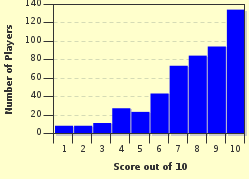Quiz Answer Key and Fun Facts
1. Who was the first Black woman to make a serious run with a major party for the Presidency?
2. She was certainly the most controversial Black woman of the 1970s. She supported the Black Panthers as well as the Student Non-Violent Coordinating Committee. When a riot ensued when a courtroom was invaded by militants, Judge Harold Haley was killed. The shotgun used was found to belong to her. She went underground for two months and was on the FBI 10 Most Wanted List. Who was she?
3. She was one of the powerful women of the civil rights and voting movement. She lead a delegation to the Democratic Convention in 1964 to protest the seating of an all white delegation from Mississippi. When offered a compromise which would have seated two Black delegates, she replied "We didn't come all the way up here to compromise. We didn't come all the way for no two seats 'cause we are all of us tired". The protest lost but the Convention voted for racial balance in 1968. She told Hubert Humphrey that the democrats would lose as they had turned their backs on the civil rights movement. Who was she?
4. Barbara Jordan served six years in Congress and built a reputation as keen legislator and an eloquent speaker. She made a powerful speech calling for the impeachment of Richard Nixon. She was the keynote speaker at the Democratic Convention of 1976 and 1992. What State did she represent in Congress?
5. For the most part the abolitionist movement in the 19th century was lead by religious folk and white women of means. This woman was born to slavery in a northern State, New York. Her owner promised her freedom but reneged, so rather than 'run' away, she 'walked' away. She adopted a new name and became a leading Black abolitionist. By what name is she known?
6. Harriet Tubman was associated with which railroad?
7. She was not the first Black woman to refuse to give up her bus seat to a white person but she was the first to spark a major boycott of the bus system in Montgomery, Alabama; a boycott by Black riders that spread in various intensity to other cities. She has been called the "Mother of the Modern Civil Rights Movement". What is her name?
8. When Martin Luther King was assassinated, his wife, Coretta Scott King, played a leadership role in keeping his ideals and visions alive. What is the central core concept of the movement she founded?
9. Milla Granson is an enigma. No one knows when she was born or died, if she married and had children, or any other personal history. But, for her time, she was one of the bravest women to confront the system. What was her contribution?
10. She served as Senator from Illinois for six years followed by a stint as Ambassador to New Zealand. She was the first African-American woman to serve in the Senate. What was her name?
Source: Author
Rehaberpro
This quiz was reviewed by FunTrivia editor
Snowman before going online.
Any errors found in FunTrivia content are routinely corrected through our feedback system.


